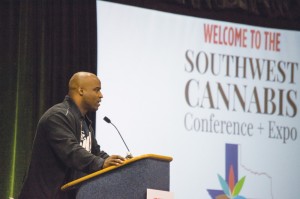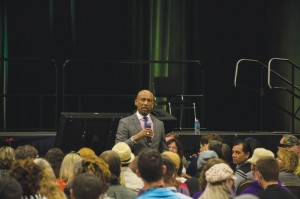
Immediately after the PTSD panel was the Gridiron Cannabis Coalition. There in the flesh (not Skyped) were Jim McMahon, Ricky Williams, and Kyle Turley, all former NFL stars who have been treating their chronic injuries with cannabis and cannabis products.
I was really excited to hear from Williams. The recent inductee to the College Football Hall of Fame talked about how dangerous football is and how his marijuana usage got him in trouble multiple times while playing –– he said he felt like a criminal. He challenged league leaders to invest in the long-term health of theirs players.
“The NFL should be doing their own research, and they should be in front of finding out how medical marijuana can help players in the NFL and former members,” Williams said. “The NFL trainer is a waste of time. The doctors just kept giving me pills that I had to take daily just to make it through practice.”
McMahon also spoke out against pharmaceutical pills, talking about their easy availability in all locker rooms. However, instead of helping, these pills, he said, are simply masking larger problems.
“Bowls of pills were available to all players for anything,” he said. “They had uppers, downers, and everything in between just sitting out for whoever wanted them. Medicinal herb is not a drug. If God didn’t want you to have it, he wouldn’t have put it here.”
McMahon, Williams, and Turley all agreed that many current and former NFLers are being misdiagnosed by doctors paid for by the league. Trying to educate all football players is the coalition’s mission.
******
Now it was time for Montel. Before he even started, the former daytime TV talk show host Mon-told everyone (ha!) that he was going to piss off half of them before he was finished.

He did not disappoint.
Williams began by talking about his childhood. The youngest of four children in the ghetto, he spent his days running around a dumpsite nearby. He said he would chase rats out of hiding in the trash to be shot at by older boys standing nearby with BB guns. His story continued as he spoke about being diagnosed with multiple sclerosis almost 15 years ago. He was on a lot of dangerous pills, he said, and he even tried to commit suicide.
“When I was at my worst, I decided to kill myself,” he said. “I sat with a gun in my mouth for two hours before I decided that I didn’t want my children to see that. So I decided to throw myself in front of a taxi cab. By some miracle, when I tripped myself into the road … the only cabby in New York City who could recognize me slammed on his breaks, jumped out of the cab, and said, ‘Oh, my, Mr. Williams. You fell.’ He helped my across the street, and I sat there and realized that there had to be a better way.”
After Williams’ botched suicide attempt, he began treating himself with marijuana. He has now been toking every day for the last 14 years. And his M.S. has been held in check. Williams also spoke about how his daughter was diagnosed with lymphoma several years ago and how she now is treating herself with marijuana. The effects, Williams said, have been positive –– unlike those of the pills that her doctors were giving her.
“Can you imagine,” he went on, tears welling up in his eyes and rolling down his cheeks, “your child coming to you and saying that the pills she was on would cause her skin to deteriorate, she was going to lose all of her hair, and there was a chance that she could cough up her own esophagus?”
A lot of people sitting around me began tearing up, too.
And then Williams went for the throat.
“If someone is getting into the medical marijuana industry with the sole purpose of making money,” he said, “they shouldn’t be doing it.”
You could almost feel every cat in a business suit tense up and catch his breath.
“If you are going to get into the medical marijuana industry,” Williams continued, “you should give medicine to the people, not try to make money off of them.”
While the entrepreneurs sat on their hands the rest of the talk, I cheered heartily. I felt Williams’ speech was inspirational, well thought out, and while a bit eccentric, coming from a place of love and care. Also, Montel Williams has done more for marijuana legalization than probably any other celebrity on the planet. He has worked with lawmakers in several states to help push through bills that may pave the way for full legalization someday. Williams believes that if more than 25 states legalize it, he will have the capability and the power to help promote marijuana legalization on a national level. It was clear from his speech that legalization is his passion.
He left the crowd with a challenge: “Do your own research.” The U.S. government, he said, has been growing and distributing marijuana to select patients for more than 30 years and owns the patent on the medical effects of marijuana. How can our government own a patent on an illegal plant with no medical properties?











